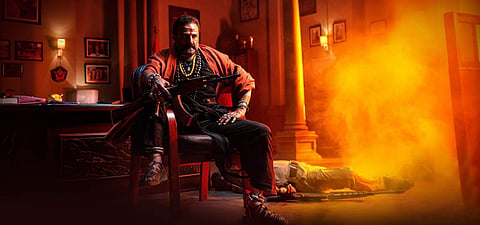Akhanda Movie Review: Balakrishna punches the goons, this film punches the audience
Rating:(1.5 / 5)
Akhanda is a true-blue Boyapati Sreenu film. This is neither a criticism nor an appreciation; I’m merely stating a fact. Ever since his debut with Bhadra, Boyapati has refused to evolve as a storyteller. What has changed, though, is the way his barbaric villains mercilessly murder dozens of junior artists. With Akhanda, Boyapati has reached a new high in savagery: A hospital where sick children are being treated explodes, a truck runs over dozens of poor men, some more men are set on fire, an entire community of labourers is gunned down. Well, what’s so surprising, you may ask. There have been several gory sequences involving mass murders in the director’s filmography. Legend, for instance, had a scene where four dozen fishermen are stabbed and diced; an equal number of background artists are killed in Sarrainodu, Simha, Vinaya Vidheya Rama, so on and so forth. In Akhanda, though, all the sequences of sadism play out in a span of 10 minutes. There’s no stopping an uncaged Boyapati Sreenu in Akhanda.
His conviction to execute the most insane of his ideas is a lesson for future filmmakers. Picture this: hundreds of goons equipped with all the weaponry from Telugu Masala Film’s godown — from machine guns to axes and even chilli powder — have to kill Balakrishna’s Akhanda Sikandar Rudra Agora (that’s his name), who is in the middle of a prayer devoting his undivided attention. Yet they miserably fail and how! That’s what I call conviction. That’s what I call taking the audience for granted. If the callousness towards the audience’s intellect and the recklessness towards storytelling wasn't outrageous enough, Thaman's loud... I mean, LOUD score is the trishulam to our ears. But, why am I questioning the decibel levels in a Boyapati film?
In between the bloody, gravity-defying fights, there is a semblance of a story. One fine day an extremist named Gajendra kills a faithful guru and takes his spot as a godman to conjure the world. The same day a couple in Rayalaseema is blessed with twins. On the same fine day Jagapathi Babu, who plays a sadhu, warns the father to let go of one of the kids because one of the infants would be destruction personified, while the other is the personification of nature. Usually, this means one of the twins is timid while the other is the wild type. But here both of them are equally violent with innovative methods to decimate their opponents. So why even estrange them? Again, why am I questioning logic in a Boyapati film?
It’s almost impossible to objectively analyse a film like Akhanda, considering how mind-numbingly dumb it is. But what can you do if that’s the film the filmmaker wanted to make. While Boyapati succeeds in what he sets out to do, the ultimate loser is of course... us. Of course, we signed up knowing the film will be loud, crass, violent, and more importantly, senseless. What surprised me, however, is the level of all these attributes. The villains in Boyapati films are cruel, and in Akhanda, it is the turn of Varadharajulu (played by Meka Srikanth, who made a career out of playing soft and kind roles) to do the needful. There is no dearth of crudeness, but here, they really start bothering you after a point: a mother is raped in front of her child and I see no point for such a sequence to exist. I think it’s shameful that filmmakers in 2021 keep using rape as a device to "infuriate" the hero. What’s funnier is the fact that Srikanth is not even given the "main villain" status. Again, why am I even questioning the writing choices in a Boyapati film?
If there’s one thing Boyapati has learned from the failure of his previous outing, the subdued superhero film Vinaya Vidheya Rama, it’s that you never play it subtle. In Akhanda, Boyapati makes his hero a proper superhero, err, God, this time. In a scene where Akhanda Sikandar Rudra Agora hits a guy, we see a goon’s soul exiting the body and as he falls back, the soul and body meet. Likewise, he can touch a human and see their past. I wish Boyapati explored this angle deeper, it could have been a fitting answer to Unbreakable. We have a heroine as well, played by Pragya Jaiswal, and in tradition with Boyapati-isms, she is hailed as an “inspiration” for the young women, and then this is immediately followed by a crude scene involving a seatbelt. Perhaps the only character who gets a proper arc is a local goon who is reformed by Muralikrishna early in the film. Again, why am I trying to analyse the craft of a Boyapati film?
There’s a funny dialogue in the film. “You punish the evildoer by confining him in a cell, I punish by sending him to hell,” Akhanda Sikanda Rudra Agora fiercely says. Boyapati's Akhanda takes it too seriously.

